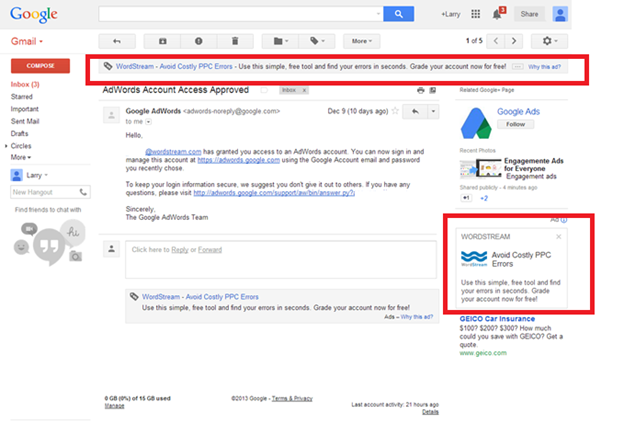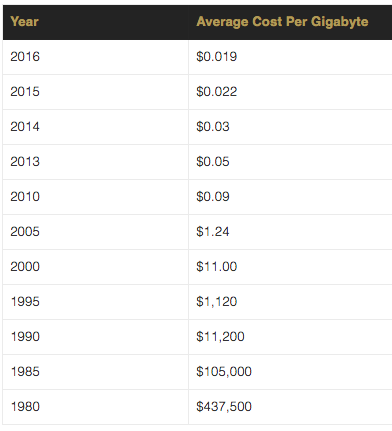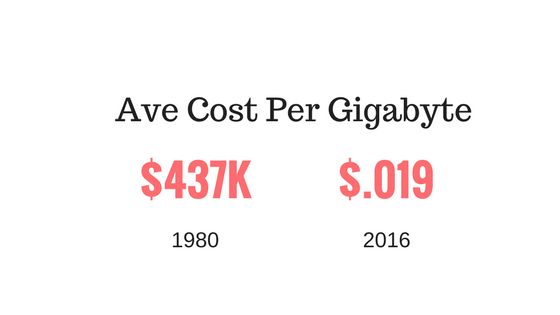In 2004, Google released Gmail. Gmail was the first web-based email service to offer 1 gigabyte (GB) of storage for free. This was unheard of back then, their closest competitor, Hotmail only offered 2 megabytes.
Today, Gmail offers 14 GB of free storage. How could they possibly do that? Well, a couple of things happened within the online internet space as well as the hardware storage space during this time.
In 2003, Google had acquired a company called Applied Semantics. Applied Semantics essentially looked at the content of the web and was able to understand, organize, and extract knowledge from websites. This was absolutely critical for Google monetization efforts and led to AdSense being the largest advertising network in the world. This acquisition made it easy for Google to programmatically read the content of every single email with gmail and serve relevant ads, helping to subsidize the cost of storage.

The second, more important thing that happened during this time was the cost of storage. It dropped 3,977,172% from 1980 to 2005. All of your email needs to be stored somewhere and that has historically cost a lot of money. Take a look at the historical cost of storage for 1 GB of data. It dropped from $11 per GB in 2000 all the way down to $1.24 in 2005. Today, a GB of storage is less than $0.019 per GB.

So, how will the dramatic decrease in storage change the rental industry? Well, we have already started to see this happen by property management software going into the cloud. Realpage, Appfolio, Entrata, Yardi, Buildium, etc are all now in the cloud. This would not have been possible 15 years ago. Getting the property management software to the cloud is only the beginning. If this was baseball, we haven’t even finished the first inning.
Hardware storage is now virtually free, with this comes major disruption and shifts within industries. The rental industry, although slow to adapt, will benefit greatly with storage costs going to virtually $0. Here are some of the changes that will occur:
- Cost of property management software will drop dramatically but revenue and profit for property management software companies will continue to increase. Most of this will come from new monetization models, lower hosting and storage costs and a decrease in employee headcount.
- New vertically focused real estate services will enter the market. Some examples:
- Software that will make small landlords operate like large property managers for free.
- Closing and title companies will be fully online, with all docs stored in the cloud.
- Similar to how Google mapped every road with their street view, CAD like software will be so simple to use and implement, every house and apartment will have some sort of 3 and 4d modeling.
- DNA and Blood reading stations will be just like computers are today, they will be in every household and apartment unit.
- Limitless online storage will allow for the Googol amount of rental data to be parsed, analyze, structured and returned to the user in real-time with rental insights we have only dreamed of.
- Packages being sent to apartments will start to diminish. More and more of the products we buy will be made in the leasing office, via advanced 3D printing. Simply go to Amazon, select your product, and have it made right in front of you for a small fee.
The rental future is bright.




















